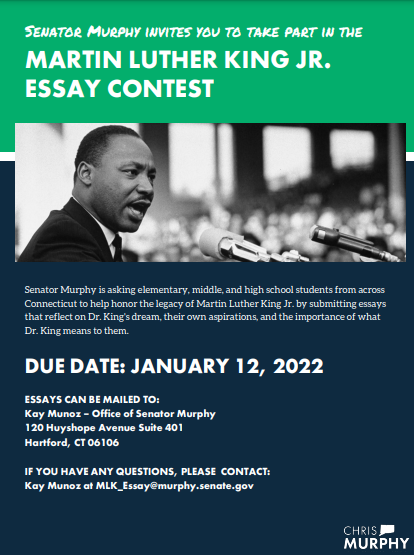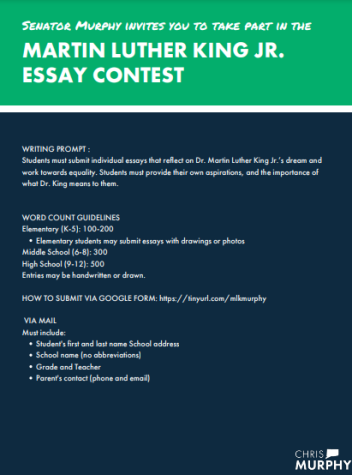Shining a Light on Martin Luther King Jr. Day’s Impact in Schools

An Incentive for Reflection: Flyer for the Martin Luther King Jr. essay contest held by senator Chris Murphy. Photo courtesy: https://resources.finalsite.net/images/v1639153396/hamden/tyfo1mi1bkcurrd57u87/MLKJrWritingContest21-22.pdf
January 14, 2022
The King Holiday Bill was signed on November 2, 1983, designating the third Monday in January a federal holiday in celebration of Martin Luther King Jr., the notorious civil rights leader who challenged racial matters and moved change in the way Americans acted and thought.
All 50 states celebrate the holiday, and with remarkable speeches and teachings that marked the minds of many, commemorating and learning about such an influential man is inevitably impactful on young generations.
History teacher Ms. Jessica Hoffer explains that Martin Luther King Jr. spoke up for what he believed in, which inspired and still inspires people to always dream and shoot for their goals, regardless of the obstacles they may face.
“It is very important to teach students about this topic because it shows students to stand up for what they believe in,” says Hoffer, “[it] shows the determination and inspiration that one person can cause!”
Ms. Elba Llantin-Cruz, Milford Public Schools Instructional Supervisor for Equity and Engagement, agrees with Hoffer but emphasizes that Martin Luther King Jr. was not the only person behind the civil rights movement and its consequences.
“Martin Luther King Jr. Day gives everyone an opportunity to appreciate the contributions of a man in the black community that was extremely important to the civil rights movement while remembering people about the others that have also greatly contributed throughout history,” says Llantin-Cruz.
Llantin-Cruz explains that Martin Luther King Jr. was the face of the civil rights era, shifting the mindsets of others about various important topics such as disegregation.
“I believe that [Martin Luther King Jr. Day] is still very relevant to today’s generation and should continue to be a historical day,” says senior Jasmine Juarez, “King played an important role in the freedom we have currently, most specifically to the freedom of people of color.”
Jurarez believes that the schools she has attended did a good job teaching about who King was and the cause supported by him. She is even able to remember by heart specific facts about the figure.
Even though Martin Luther King Jr. Day is only celebrated on one day and Black History Month lasts a mere month, King’s contributions to the nation are embedded in multiple classes’ curricula. This influence will come even stronger now with Foran’s new curriculum that allows students to learn about African-American history. 
Connecticut Governor Ned Lamont signed in December of 2020 the Public Act No. 19-12, claiming that all Boards of Education in the state are now required to include an elective African-American and Latino history classes that allow for students to acquire more knowledge on the history, culture, and society of those people.
Cruz explains that teaching about the history of Americans and Afro-Americans combined is important because they have both been integral parts of the history of the country and have greatly contributed to America’s current economy, culture, legal system, politics, and religion.
Junior Jose Abreu believes schools don’t always teach about those topics enough.
In his opinion, educators should give more stress to how people like King, for example, accomplished so much just by using their voices.
“He was a very motivational person and sometimes we let all the great stuff he got accomplished slip,” says Abreu.







